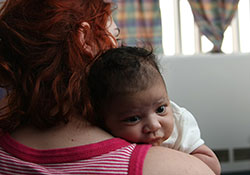10 things to know about women in prison

Department of health, London
- Although women constitute a very small proportion of the total prison population in Europe, 4–5% on average, the number of women in prison is increasing rapidly.
- In Europe, there are about 100 000 women in prison on any given day.
- Most offences for which women are imprisoned are non-violent, property or drug related.
- Many women in prison are mothers and usually the primary or sole carers for their children. Around 10 000 babies and children in Europe are estimated to be affected by their mother’s imprisonment.
- In most European countries, babies and young children can stay in prison with their mothers: 3 years is the most common age limit. Facilities vary widely between countries.
- Mental illnesses are overrepresented among women prisoners; 80% of women in prison have an identifiable mental illness and two thirds suffer from a substance-related disorder.
- At least 75% of women entering European prisons are estimated to have problems with drug and alcohol use. Further, women prisoners are more likely than male prisoners to inject drugs.
- The prevalence of HIV and other infectious diseases is often higher among women prisoners.
- Women prisoners are more likely to harm themselves and commit suicide.
- Women prisoners are three times more likely to report having experienced physical or sexual abuse before their imprisonment.



